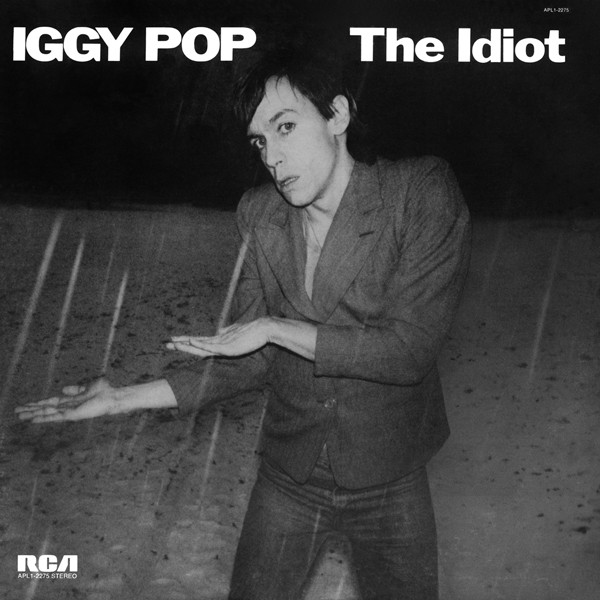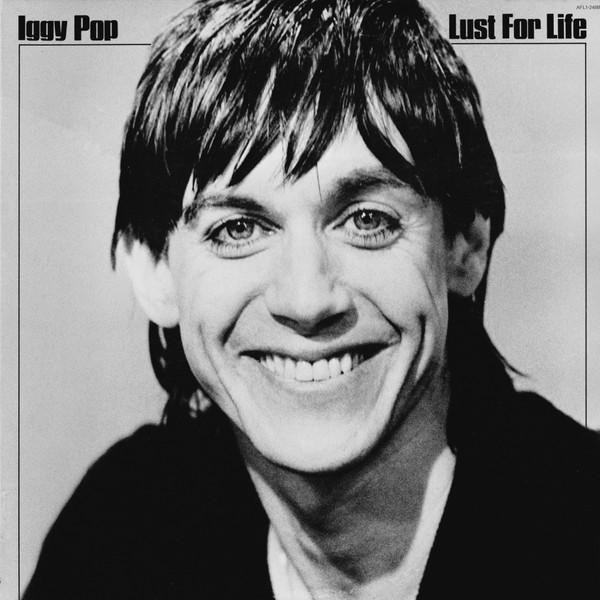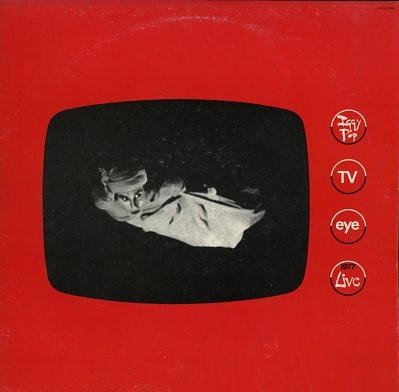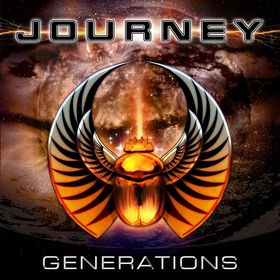Then there was Iggy Pop. Bowie loved the garage anarchy of the Stooges, and helped get their Raw Power album onto shelves. (He also appropriated Iggy’s croon into his own vocal styles.) A few years later, both Bowie and Iggy were trying to get off drugs, so they went to France and then Germany to work as artists. Between them they completed four albums that were all released in 1977, and all remain high points of their respective catalogs.
 Everything on The Idiot was written by the pair, backed by Carlos Alomar and the rhythm section of George Murray and Dennis Davis. While still trashy (“Funtime” and “Baby”), Bowie’s arty tendencies took over to slow the music down and find grooves. “Sister Midnight” and “Nightclubbing” paint vivid pictures of their lifestyle, while “China Girl” would one day get a new lease on life. “Dum Dum Boys” is something of a lament for old bandmates, “Tiny Girls” sports a doo-wop saxophone, and “Mass Production” turns the drone of “Station To Station” into something more robotic. Besides being removed from the assault of the Stooges albums, The Idiot is a startling album, but now we can hear it as very much a blueprint for bands like Joy Division, as well as what would become side one of Low.
Everything on The Idiot was written by the pair, backed by Carlos Alomar and the rhythm section of George Murray and Dennis Davis. While still trashy (“Funtime” and “Baby”), Bowie’s arty tendencies took over to slow the music down and find grooves. “Sister Midnight” and “Nightclubbing” paint vivid pictures of their lifestyle, while “China Girl” would one day get a new lease on life. “Dum Dum Boys” is something of a lament for old bandmates, “Tiny Girls” sports a doo-wop saxophone, and “Mass Production” turns the drone of “Station To Station” into something more robotic. Besides being removed from the assault of the Stooges albums, The Idiot is a startling album, but now we can hear it as very much a blueprint for bands like Joy Division, as well as what would become side one of Low.
 To promote the album, Bowie actually went on tour with Iggy, playing keyboards and adding vocals alongside the Sales brothers (Tony on bass and Hunt on drums and vocals) and guitarist Ricky Gardiner. Then the band went right back into the studio to record Lust For Life. This time Iggy was more in charge, relying less on Bowie to provide music and scenarios, and it works. It also rocks, from the Motown-derived pounding of the title track through “Sixteen” and “Some Weird Sin”, the latter of which sports some wonderful backing Bowie vocals. Ricky Gardiner’s chords drive “The Passenger”, but “Tonight” is most striking if you’ve only heard Bowie’s tame cover, which doesn’t include the prelude. The call-and-response of “Success” is just plain hilarious, making the pleas in “Turn Blue” even more arresting. “Neighborhood Threat” would also get a Bowie remake one day, while the band swapped instruments for the trashy “Fall In Love With Me”.
To promote the album, Bowie actually went on tour with Iggy, playing keyboards and adding vocals alongside the Sales brothers (Tony on bass and Hunt on drums and vocals) and guitarist Ricky Gardiner. Then the band went right back into the studio to record Lust For Life. This time Iggy was more in charge, relying less on Bowie to provide music and scenarios, and it works. It also rocks, from the Motown-derived pounding of the title track through “Sixteen” and “Some Weird Sin”, the latter of which sports some wonderful backing Bowie vocals. Ricky Gardiner’s chords drive “The Passenger”, but “Tonight” is most striking if you’ve only heard Bowie’s tame cover, which doesn’t include the prelude. The call-and-response of “Success” is just plain hilarious, making the pleas in “Turn Blue” even more arresting. “Neighborhood Threat” would also get a Bowie remake one day, while the band swapped instruments for the trashy “Fall In Love With Me”.
 By the time Lust For Life came out, Bowie was busy recording his own “Heroes” album, so Iggy ended up touring the album with future Heartbreaker Scott Thurston and Stacey Heydon replacing Bowie and Gardiner augmenting the Sales brothers. TV Eye 1977 Live, released a year later, was split between shows played by the two bands, and for the longest time was the only evidence of Bowie’s onstage work with Iggy. The sound is bootleg quality, recorded and mixed on the cheap to get out of his label contract, but still crackles with energy—or at least power when the songs slow to a crawl—particularly on the Stooge classics “T.V. Eye”, “Dirt”, and “I Wanna Be Your Dog” and the rare “I Got A Right”.
By the time Lust For Life came out, Bowie was busy recording his own “Heroes” album, so Iggy ended up touring the album with future Heartbreaker Scott Thurston and Stacey Heydon replacing Bowie and Gardiner augmenting the Sales brothers. TV Eye 1977 Live, released a year later, was split between shows played by the two bands, and for the longest time was the only evidence of Bowie’s onstage work with Iggy. The sound is bootleg quality, recorded and mixed on the cheap to get out of his label contract, but still crackles with energy—or at least power when the songs slow to a crawl—particularly on the Stooge classics “T.V. Eye”, “Dirt”, and “I Wanna Be Your Dog” and the rare “I Got A Right”.
All three albums would become cult classics despite low sales, and all three were included on 2020’s comprehensive The Bowie Years box set. A disc of negligible single mixes and alternate takes is capped by the Bowie-produced “I Got A Right” single and an recent interview with Iggy, while three discs present three live performances with mostly identical setlists and Bowie on board, from London’s Rainbow, Cleveland’s Agora, and a Chicago radio station. These vary in quality, but we do hear pre-studio renditions of “Turn Blue”, “Tonight”, and “Some Weird Sin”, as well as further Stooge favorites. (Meanwhile, Deluxe Editions of The Idiot and Lust For Life were each bolstered by a live disc: the Rainbow show from the box for the former, and TV Eye for the latter.)
Iggy Pop The Idiot (1977)—3½
2020 Deluxe Edition: same as 1977, plus 15 extra tracks
Iggy Pop Lust For Life (1977)—4
2020 Deluxe Edition: same as 1977, plus TV Eye 1977 Live
Iggy Pop TV Eye 1977 Live (1978)—3
Iggy Pop The Bowie Years (2020)—3




